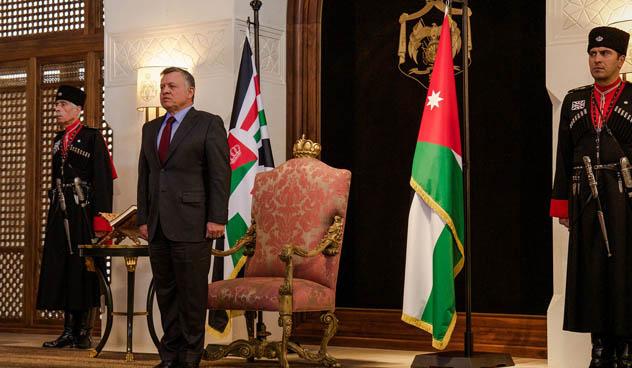His Majesty's Constitutional Authorities

His Majesty the King is regarded as the Head of State in accordance to the provisions of the Jordanian political system, and the Head of the Executive Authority, with powers exercised through The Prime Ministry in accordance to Article 26 of the constitution. His Majesty is immune to liability and responsibility; he is the country’s symbol of unity and national identity. His Majesty the King has powers and capacity in the internal and external affairs of the state, politically, legislatively, militarily, judicially, administratively and economically.
In accordance to the constitution, the powers and capacities of His Majesty of King Abdullah are as follows:
"His Majesty the King has powers and capacity in the internal and external affairs of the state, politically, legislatively, militarily, judicially, administratively and economically."
- The King shall ratify the laws, promulgate them and order the enactment of the regulations necessary for their implementation.
- The King is the Supreme Leader of Land, Naval, and Air Force.
- The King declares war, makes peace and concludes treaties and agreements.
- The King issues orders for the holding of elections to the House of Representatives in accordance with the provisions of the law, in addition to convening the Parliament, inaugurating, adjourning, proroguing it in accordance with the provisions of the Constitution.
- If the House of Representatives is dissolved for any reason, the new House may not be dissolved for the same reason.
- The government -in the tenure of which the House of Representatives is dissolved- shall resign within a week from the date of dissolution; and its head may not be designated to form the government that follows.
- The King appoints the Prime Minister, dismisses him and accepts his resignation, and appoints the Ministers, dismisses them and accepts their resignation upon the recommendation of the Prime Minister.
- The King appoints the Speaker of the Senate and appoints the members of the Senate, in addition The King may dissolve the Senate or relieve one of its members of the membership.
- The King shall appoint the Commander of Army and the Director of Intelligence, dismiss them, and accept their resignation.
- The President and Members of The Constitutional Court shall be appointed by His Majesty.
- Judges of the Civil and Sharia Courts shall be appointed and dismissed by Royal Decree in accordance with the provisions of the laws.
- The King creates, confers, and withdraws civil and military ranks, medals, and other honorific titles.
- His Majesty has the right to special pardon and to remit the sentence.
- No death sentence shall be executed except after ratification by the King and every such sentence shall be placed before him by the Council of Ministers accompanied by its opinion thereon.
- Currency shall be minted in the name of the King in implementation of the law.
- Declaration of martial law or an emergency.
These powers and capacities are not exercised by His Majesty King alone or directly, but entrusted to the relevant institutions and organisations that comprise the country. The King exercises the powers vested in him by Royal Decree, signed by the Prime Minister and the Minister or Ministers concerned. Hence, His Majesty the King is immune to any criminal or political liability and responsibility; he is above criticism or objection, and is not subject to trial by any authority.
It is worth mentioning that the 2014 constitutional amendments decided to connect the King with appointing, dismissing, and accepting the resignations of the Commander of Army and the Director of Intelligence, without the placement or signature of the Prime Minister, in order to maintain the separation of those two important positions from any political tension that may be generated in the era of the parliamentary governments, which aims to preserve the continuity of loyalty of these two institutions to the country and to public interest, and not to any political party affiliation.
Furthermore, His Majesty’s verbal and written decrees do not relieve ministers of their duties; the Prime Minister and the Ministers have a joint responsibility for the general policy of the country before the House of Representatives.


